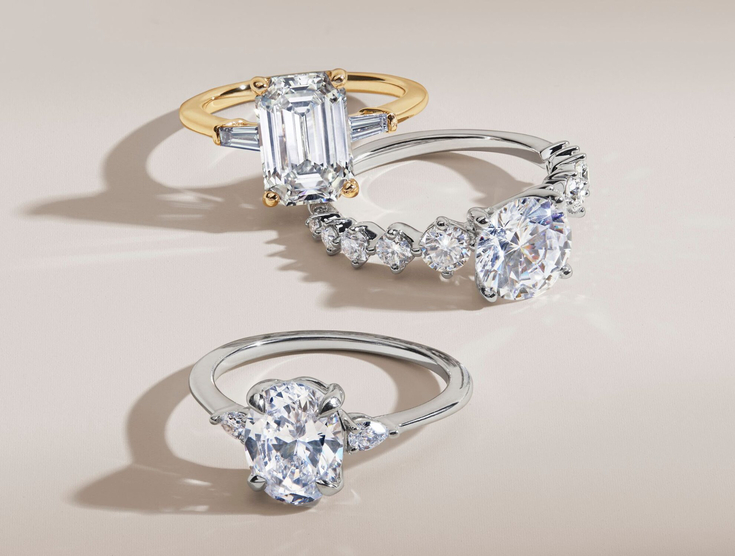For centuries, diamonds the #1 choice have been synonymous with luxury, elegance, and eternal love. Their brilliance has made them the go-to choice for engagements, celebrations, and timeless jewelry. However, as consumer preferences evolve, the once clear distinction between natural and lab-grown diamonds is fading. Today, lab diamonds have emerged as a revolutionary and eco-friendly alternative, offering the same sparkle at a more affordable price. In this article, we explore why lab diamonds have become the #1 choice for modern consumers.
Table of Contents
The Rise of Lab Diamonds
Lab-grown diamonds, also known as synthetic or cultured diamonds, are created in controlled laboratory environments that mimic the natural diamond-growing process. Using advanced technology, scientists replicate the high-pressure, high-temperature conditions (HPHT) or chemical vapor deposition (CVD) method, allowing these diamonds to form with the same chemical, physical, and optical properties as natural diamonds.
A Diamond is a Diamond
One of the most important factors to understand is that lab diamonds are real diamonds. Contrary to common misconceptions, they are not fakes or substitutes like cubic zirconia or moissanite. Lab diamonds are composed of pure carbon, just like mined diamonds, and are identical in hardness, brilliance, and beauty. The only difference is their origin.
With this in mind, lab diamonds have quickly gained traction in the jewelry industry, giving consumers a fresh alternative to mined diamonds while maintaining the same allure and sophistication.
Why Lab Diamonds Are the #1 Choice
Several key factors have propelled lab diamonds to become the preferred choice for a growing number of buyers:
1. Affordability Without Compromise
One of the biggest advantages of lab-grown diamonds is their affordability. Because they don’t require the extensive mining process that natural diamonds do, lab diamonds come at a significantly lower cost—sometimes as much as 30% to 40% less. Consumers are now able to purchase larger, higher-quality diamonds for their budget without sacrificing the sparkle or clarity.
2. Ethical and Conflict-Free
The diamond industry has long been associated with ethical concerns, particularly regarding “blood diamonds” or diamonds that fund conflict in war-torn regions. Lab-grown diamonds eliminate these concerns entirely. They are created in a controlled environment with transparent, ethical production methods, ensuring that buyers can purchase them without fear of supporting harmful practices.
3. Environmental Sustainability
Mining diamonds requires a substantial amount of energy, land, and resources, often resulting in environmental degradation, deforestation, and displacement of wildlife. Lab diamonds, on the other hand, are created in laboratories using far fewer resources. They have a much smaller carbon footprint, making them a more sustainable option for eco-conscious consumers.
4. Transparency and Certification
Just like natural diamonds, lab-grown diamonds are graded and certified by reputable institutions such as the Gemological Institute of America (GIA) and the International Gemological Institute (IGI). This ensures that buyers receive an authentic diamond with clear documentation of its carat weight, cut, clarity, and color.
5. Innovation and Customization
Lab-grown diamonds open the door to innovation in design and customization. With access to a wide variety of shapes, sizes, and colors, consumers can personalize their jewelry with ease. Whether it’s a unique engagement ring, a bespoke pendant, or custom diamond earrings, lab diamonds provide more options for creativity in jewelry making.
Who’s Choosing Lab Diamonds?
The shift toward lab diamonds is being driven primarily by younger generations, particularly Millennials and Gen Z. These generations place a high value on sustainability, social responsibility, and transparency. They are more likely to support products that align with their ethical values, and lab diamonds check all those boxes. Additionally, the growing awareness of climate change and environmental preservation has played a significant role in the demand for eco-friendly alternatives in the jewelry market.
Celebrities Embracing Lab Diamonds
The rise of lab diamonds hasn’t gone unnoticed in Hollywood and fashion circles. A growing number of celebrities and public figures are embracing lab-grown diamonds for their red carpet appearances and personal jewelry collections. This endorsement by influential figures is further boosting the popularity and credibility of lab-grown diamonds among consumers worldwide.
The Future of the Diamond Industry
The increasing demand for lab diamonds signals a shift in the global jewelry market. As technology continues to improve, the production of lab-grown diamonds will likely become even more efficient, further driving down costs and expanding options for consumers.
At the same time, the traditional diamond industry will need to adapt to this new reality. While natural diamonds will always have their place, particularly for those seeking rare or vintage stones, lab diamonds offer a modern, accessible, and ethical alternative that appeals to a broader audience.
A Diamond for Every Occasion
Whether it’s an engagement ring, a wedding band, or a special anniversary gift, lab diamonds are becoming the top choice for many individuals. With the option to choose between the same dazzling cuts, carat sizes, and styles as natural diamonds, buyers no longer need to compromise on quality or ethics when selecting the perfect diamond.
Conclusion: Lab Diamonds – The New #1 Choice
As consumer awareness grows and values shift, lab-grown diamonds are steadily climbing to the top of the jewelry market. Their affordability, ethical production, and environmental sustainability make them a compelling alternative to mined diamonds. In an age where consumers demand more from the products they purchase, lab diamonds stand out as the ideal choice for those seeking both beauty and responsibility.

